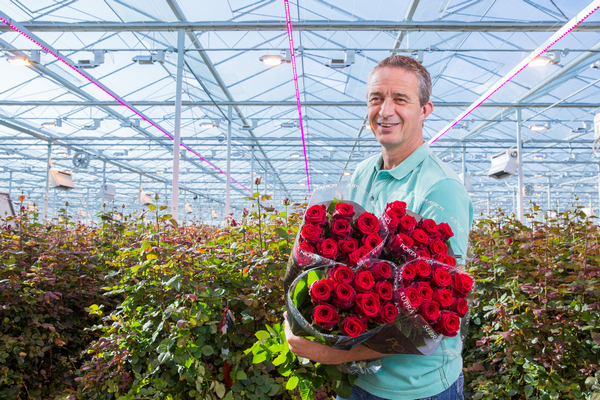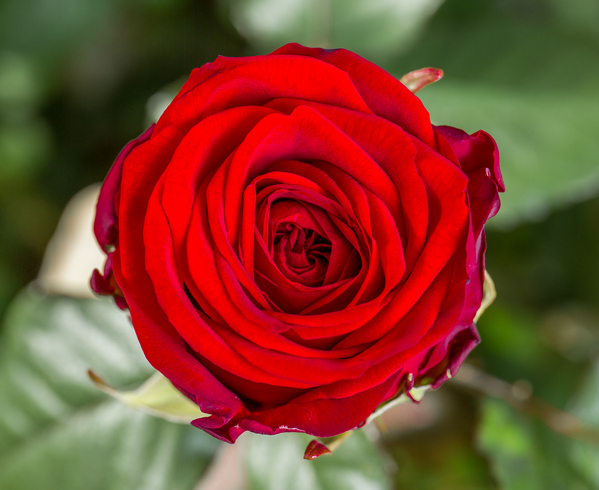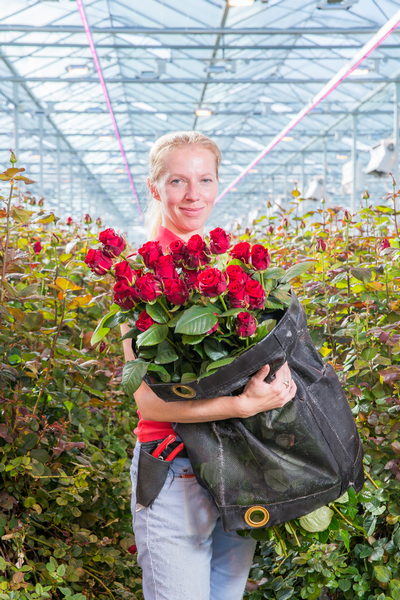Royal Philips , the global leader in lighting, is helping rose growers increase yields and improve the quality of the most romantic, yet light-intensive flower in the world. Philips GreenPower toplighting LED solution brings more light for the same amount of energy, optimized light spectrum and a significant reduction in radiated heat. Today, Philips announces that three major cut rose producers from Belgium and The Netherlands have installed GreenPower toplighting and are using Philips’ light recipes to obtain significant improvements.
Philips GreenPower LED toplighting, introduced in July 2015, enables higher yields, greater quality and lower costs than other available solutions. LED toplighting is 50% more efficient in converting electricity to light (up to 2.7 μmol/Joule) than high pressure sodium (HPS) systems that have been prevalent in the market. The new solution allows growers to give crops the optimum light levels, reducing radiated heat and increasing yields. Plant quality is improved because each plant gets the right light spectrum for optimal growth and development. Growers can also reduce operational costs, seeing up to 42% energy savings compared to HPS lighting, lower installation costs and maintenance costs.
 |
|
Philips is working with several rose growers and increasing their yield rates with LED grow lights. (All photos courtesy of Philips) |
“There is a growing amount of scientific evidence showing the benefits of LED toplighting for the floriculture business,” said Udo van Slooten, General Manager of Philips Horticulture LED Solutions. “This technology is particularly interesting for rose growers because their crops require some of the highest levels of light in the floriculture industry. It’s not unusual for roses to require 4,000 to 5,000 light hours in a year. Growers can use LED toplighting to save energy, steer their climate better, create more lighting hours in spring, summer and autumn and get more growth and/or quality.”
 |
|
Roses can require up to 4,000 to 5,000 hours of lighting per year. A close up of a red rose at Wimceco BVBA in Boechout, Belgium. |
The floriculture industry has embraced Philips GreenPower toplighting LED since it was introduced earlier this year, with many leading growers installing the solution in their greenhouses. LED toplighting has been particularly attractive to cut rose producers because they require more light hours per year than other less intense flowers. Cut rose growers using Philips GreenPower toplighting include:
-
Family run commercial rose grower Wimceco BVBA, which is using Philips GreenPower LED toplighting in its 17,000 square meter greenhouse in Boechout, Belgium.
-
Scheers Rose Nursery in Kontich, Belgium is installing Philips GreenPower LED toplighting over about 15,000 square meters to enable longer growing hours due to greater control of temperature and CO² levels thanks to the new LED toplighting radiating far less heat.
-
115-year old Porta Nova, the biggest grower of Red Naomi roses in the world, is trialing Philips new LED toplighting module over 1300 square meters in Waddinxveen, The Netherlands to reduce energy costs and emissions in anticipation of stricter emission regulations.
 |
|
Rose groweres have seen their rose yield rates grow. A worker at from one of the rose growers Philips is collaborating with. |
“With LED toplighting, I can switch on my LED separately so less heat is produced, meaning we don’t have to vent off excess heat and can leave the windows closed longer,” Wim Scheers, owner of Scheers Nursery said. “Keeping air inside reduces my costs, and also helps me maintain a better balance because I’m not constantly having to add extra CO² to compensate for what’s going out the window. I will be able to light my plants for more hours without raising the crop temperature and retain more CO² which will increase my crop growth and thereby increase my quality or yields.”
Philips will display its GreenPower LED toplighting solution for cut roses and other floriculture at the International Floricultural Trade Fair (IFTF) in Vijfhuizen, The Netherlands, 4-6 November 2015 at Booth #A1.01.





 CN
TW
EN
CN
TW
EN








